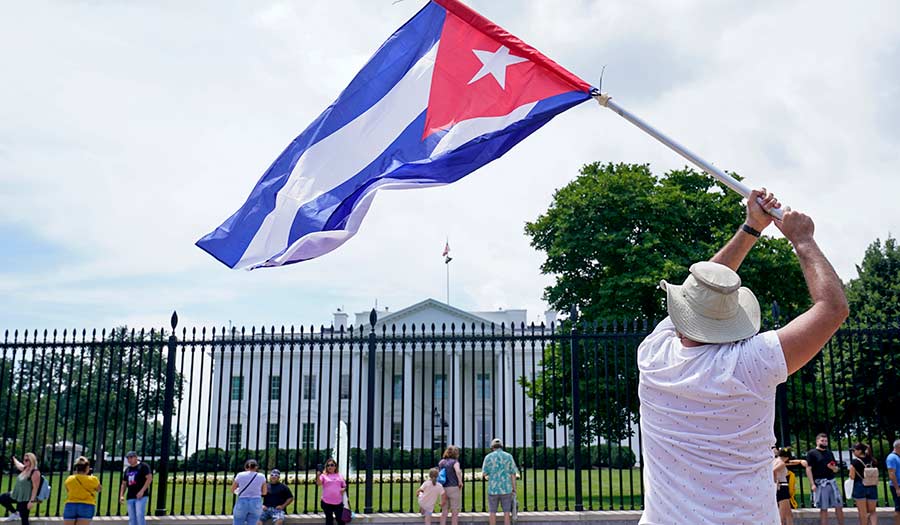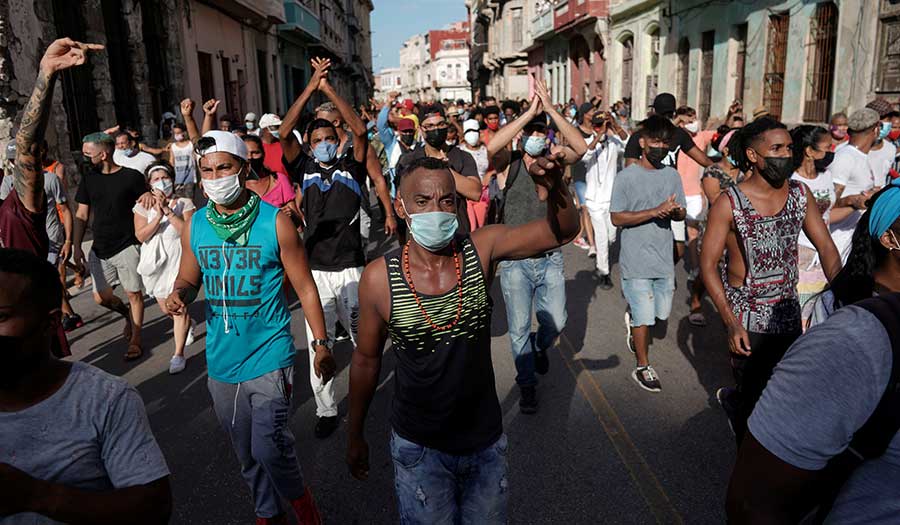 AP/Susan Walsh
AP/Susan Walsh
World News Desk
Learn the why behind the headlines.
Subscribe to the Real Truth for FREE news and analysis.
Subscribe NowWASHINGTON (AP) – They are two tiny Caribbean states whose intractable problems have vexed U.S. presidents for decades. Now, Haiti and Cuba are posing a growing challenge for President Joe Biden that could have political ramifications for him in the battleground state of Florida.
Cuban demonstrators have taken to the country’s streets in recent days to lash out at the communist government and protest food shortages and high prices amid the coronavirus pandemic. In Haiti, officials are asking the U.S. to intercede in a roiling political crisis after last week’s assassination of President Jovenel Moise in a nation where military and humanitarian interventions by U.S. presidents from Woodrow Wilson to Barack Obama have proved to be politically harrowing.
Biden is facing increased pressure from Republican lawmakers for his administration to step up support of Cuban demonstrators. And his aides have demonstrated determined caution in response to requests for more U.S. involvement in Haiti.
The administration has come under fire from both sides of the political spectrum for its responses to each of the crises, both unfolding less than two hours’ flying time from Miami. The troubled U.S. history in both countries has hardened positions, making virtually any policy decision politically unpalatable for a president seeking to toe a middle line.
Indeed, as the situations play out in Cuba and Haiti, Biden administration officials have responded cautiously.
The White House on July 11 dispatched representatives from the Justice Department, the Department of Homeland Security and the White House National Security Council to meet with Haiti’s interim Prime Minister Claude Joseph, designated Prime Minister Ariel Henry and Joseph Lambert, the head of its dismantled Senate, whom supporters have named as provisional president in a challenge to Mr. Joseph.
White House officials said Haiti’s request for the U.S. to deploy troops was under review. At the State Department, spokesman Ned Price said Tuesday he was not aware that the administration had rejected any request from Haitian officials but said the focus was on supporting the investigation into the assassination rather than providing military assistance.
U.S. officials have also made clear that the administration remains concerned about the infighting over who is rightfully Moise’s successor in Haiti.
The White House is coordinating with Mr. Joseph in his capacity as acting prime minister, but is urging Haitian officials to work together to hold legislative and presidential elections as soon as feasibly possible.
Meanwhile, the White House said a review of its Cuba policy remains underway.
To be sure, U.S. efforts to press for regime change have had their fair share of failures over the years: the 1961 Bay of Pigs invasion, CIA-backed assassination attempts on Cuban leader Fidel Castro, and sanctions that inflicted pain but never produced the ultimate goal of ending communist rule.
“We’re going to be taking a close look at what has and has not worked in the past, and unfortunately in the case of Cuba, there may be more that has not worked than what has worked,” Mr. Price said.
This week, Cuban police have been out in force as President Miguel Diaz-Canel has accused Cuban Americans of using social media to spur a rare outpouring of weekend protests. The demonstrations in several cities and towns were some of the biggest displays of antigovernment sentiment seen in years in tightly controlled Cuba, which is facing a surge of coronavirus cases as it struggles with its worst economic crisis in decades.
There are political crosscurrents for Mr. Biden as he addresses both situations.
On Cuba, the political right in the U.S. has accused Mr. Biden—who said as a presidential candidate that he would revert to Obama-era policies that loosened decades of embargo restrictions on Havana—of not being supportive enough of Cuban dissidents.
Democrats, meanwhile, are unhappy that Mr. Biden has yet to reverse Mr. Trump’s hard-line approach to the island’s communist government as his administration carries out its review of Cuban policy.
Carlos Diaz-Rosillo, who served as a director of policy and interagency coordination in the Trump White House, said the situations in Cuba and Haiti offer Mr. Biden a chance to demonstrate his oft-repeated dictum that democracies can better service their people than autocracies as well as his preference for multilateral efforts to address big global problems.
“This is an administration that says that they believe in international organizations and that they believe in these multilateral bodies. If that’s the case, get our allies in the hemisphere together…and see how they can rally others to help out,” Mr. Diaz-Rosillo said.
- World News Desk
- AMERICAS
 Cuba Sees Biggest Protests for Decades Amid Shortages, Rising Prices
Cuba Sees Biggest Protests for Decades Amid Shortages, Rising Prices


